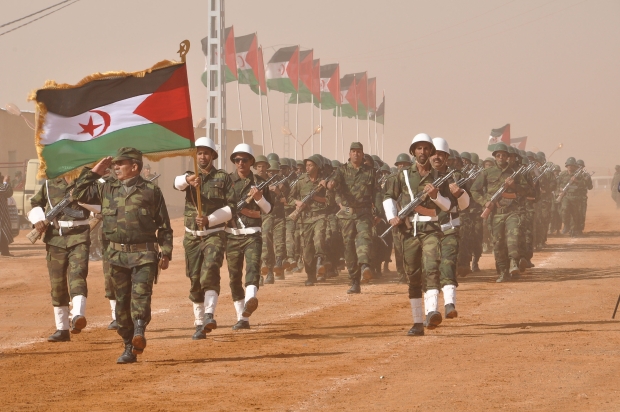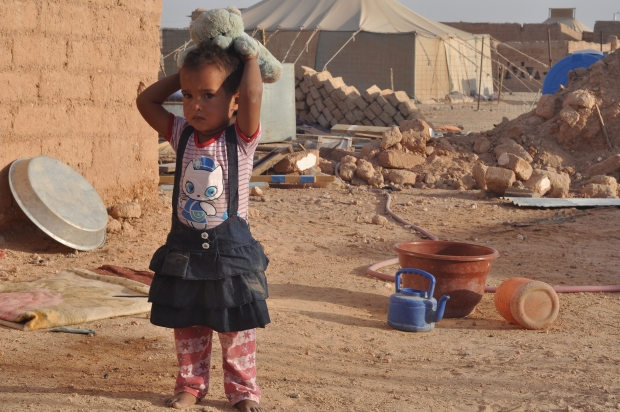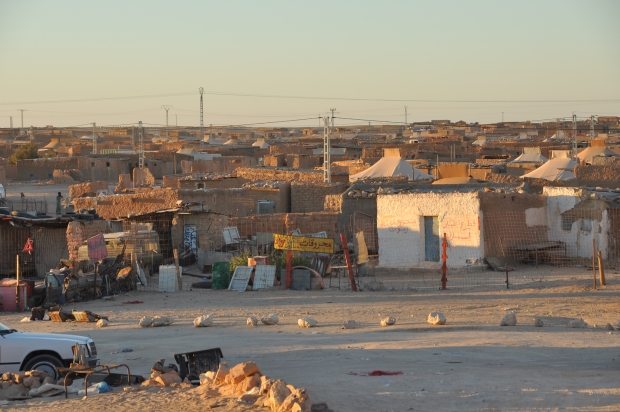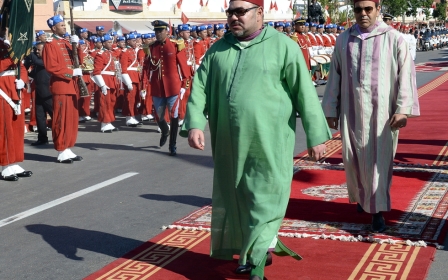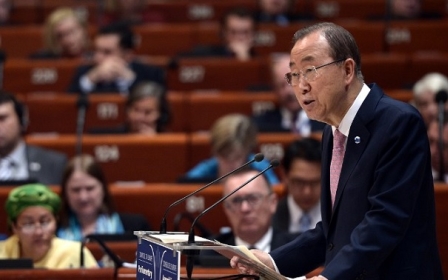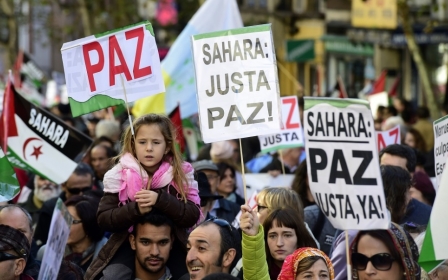Independence movement gears up for armed struggle in Western Sahara
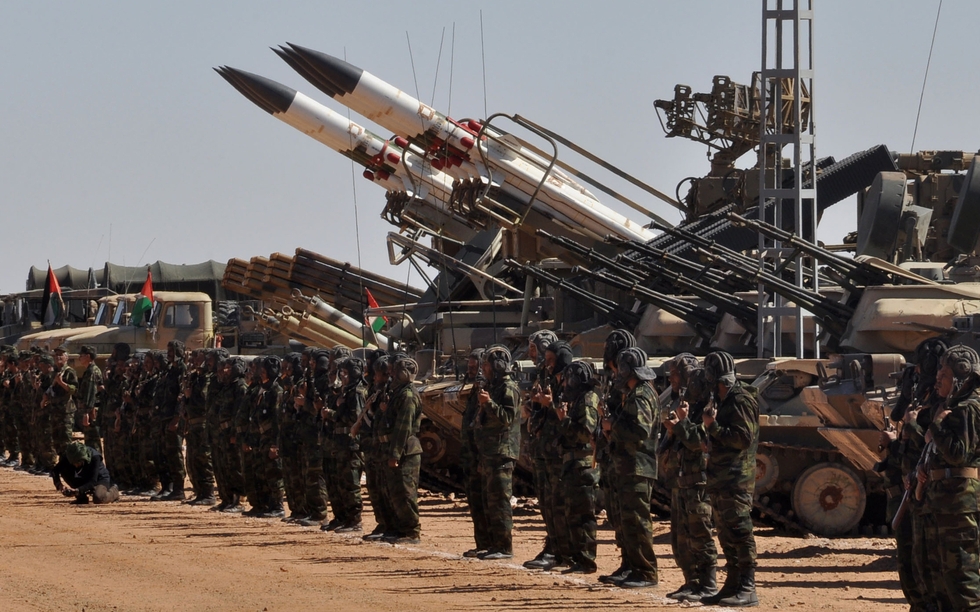
TINDOUF, Algeria - After decades of living in the harsh and extreme desert climate in Algeria’s southwest, Sahrawi refugees and some of their leaders say they have had enough and are eyeing a return to armed resistance.
As the independence movement for Western Sahara - known as the Polisario Front - gathered in southern Algeria to commemorate the 40-year anniversary of their founding in late February, their military might was out in force. Guns, tanks and rocket launchers were all rolled out as nearly 25,000 men in uniform raised the Western Sahara flag and vowed to return to their homeland.
“By organising the military exhibitions of the SADR's [Sahrawi Arab Democratic Republic] 40th anniversary, the Sahrawis want to show they have a well-prepared army,” the front’s prime minister, Omar Taleb, told reporters.
“The armed struggle for the independence is a possibility that isn’t ruled out and for which we are preparing.”
The front traces its roots back to the 1970s when it was formed to drive out Spanish colonialists. However, once the Spanish left, Moroccan forces marched in and annexed the territory in a move never recognised by the international community. A bloody guerrilla war ensured with thousands of Sahrawis being driven out to neighbouring Algeria where they have been left to eke out a living in basic camps in some of the harshest conditions on earth.
While an UN-brokered peace deal was signed in 1991, many of its promises have failed to take shape and an agreed referendum on independence has not happened.
International pressure to find a solution has been growing, with Ban Ki-Moon last week becoming the first UN secretary general to visit the disputed region since the conflict began. After touring the camps in Algeria, now home to some over 90,000 Sahrawis, he said he was “moved and even saddened” by the anger many felt and issued fresh calls to resume talks.
His visit came just weeks after a major spat broke out between Rabat and the EU and after the European Court of Justice ruled that a farm trade deal was illegal because it included the Western Sahara.
Despite the tensions, however, Morocco has stayed firm, and talks between the Polisario Front and Morocco have been stalled since 2013. Late last year, King Mohamed VI proudly announced that the “Sahara will remain part of Morocco until the end of time”.
But this is a future many young Polisario Front supporters and fighters say they simply cannot swallow, with the SADR's Foreign Affairs Minister Mohamed Salem Ould Salek hitting back after the king’s statements and saying his people had been left “no choice but to return to armed struggle”.
Mohamed Baba, 33, a soldier, told Middle East Eye that “he joined the army ranks to defend my people and recover our independence.
“So far negotiations brought only a batch of disappointment and failure. That’s why things have to change.”
Stalled peace process
SADR’s official policy remains finding a peaceful solution to the conflict but Taleb says that this could well change if concessions are not made quickly.
For years, Polisario Front negotiators who have been exiled due to decades of conflict have been growing out of touch with the Sahrawi youth who don’t directly remember the fighting and are desperate for change.
“We’ve waited for so long in the desert but for how much longer should we wait?” said Nafai, 45, a soldier whose father was killed by the Moroccan army during the guerilla war.
Algeria has long been seen as a direct supporter of the Polisario Front. It has hosted the government in exile for decades and has previously been linked to the delivery of arms, training, financial aid, and food. It has also been accused of using the Western Sahara issue to promote its own interests and undermine regional rivals.
However, few in Algeria or the Polisario Front want to talk about the alleged ties and Algeria has been quick to deny it is providing military support. An Algerian official, who requested anonymity, told MEE there was already too much uncertainty in the region, particularly in neighbouring Libya, which would make “a new armed conflict too risky”.
“A new war will lead to a real disaster and cause a situation that is unmanageable, without mentioning the human tragedy and migration that it will lead to,” he added.
Ali Zaoui, a North African security expert, also told MEE that a sense of frustration, not Algerian meddling, was to blame for the renewed threat of violence.
“After almost three decades of ceasefire, it is obvious to the Sahrawi that the only solution is to return to armed struggle because diplomatic means have not brought an end to the conflict,” he said. “I don’t really buy the idea that Algeria participated in arming the Front’s army.”
According to Zaoui, “SADR is a full and well-established state with ministries and an army” and is operating in a region rife with smugglers and militant groups “where everything can be bought and sold”.
“In my experience, they have obtained arms and been able to arm themselves … like any other country as they’re recognised by dozens of other countries,” he added.
Mounting humanitarian crisis
Further fuelling tensions has been the decline in humanitarian assistance which has dried up as global aid budgets have shrunk in the wake of the 2008 economic crisis.
Even as resources have dwindled, demand has shot up.
According to the UNHCR, over 90,000 Sahrawi refugees live in camps, yet their number keeps increasing year after year.
Last November, fierce floods affected over 25,000 people, according to UNHCR’s figures. Floods devastated refugees’ homes including food supplies that where damaged or destroyed. Reconstruction is ongoing, but in Dakhla camp, destroyed houses are still visible.
“I was born and grew up in these camps and our situation hasn’t changed at all. Life has become more and more difficult particularly in the desert with four children,” said Djamila, 35, who live in one of the camps.
Dhia, a student of 22, explained to MEE how frustrating it is to live in expectation without any sign of progress. The “negotiation process isn’t helping at all, but as (the) elders’ choice is to go for it, we can’t do anything but follow them. However, we won’t be as patient as we used to be, and the military option has been brought as the solution if nothing changes.”
With internal pressure mounting, Morocco is becoming increasingly isolated internationally - given its problems with the African Union (of which it is not a member), as well as the United Nations and the European Union, which have voiced concerns over human rights. Many Sahrawis say that the time for action is nigh.
“Western Sahara has become a mature state,” Brahim Ghali, head of the front’s political committee, told MEE. “There is no reason to doubt the achievements of the Sahrawi state.”
Foreign Minister Salem agreed.
“That’s why we say it’s a good time for Morocco to seize the opportunity and come to its senses by agreeing to apply [terms] that it has duly signed under the UN auspices and the African Union.”
“The international community (and) the UN, including the EU, don’t recognise Morocco’s sovereignty over our territory. Morocco’s policy, by the end, isn’t going to yield results.”
New MEE newsletter: Jerusalem Dispatch
Sign up to get the latest insights and analysis on Israel-Palestine, alongside Turkey Unpacked and other MEE newsletters
Middle East Eye delivers independent and unrivalled coverage and analysis of the Middle East, North Africa and beyond. To learn more about republishing this content and the associated fees, please fill out this form. More about MEE can be found here.


